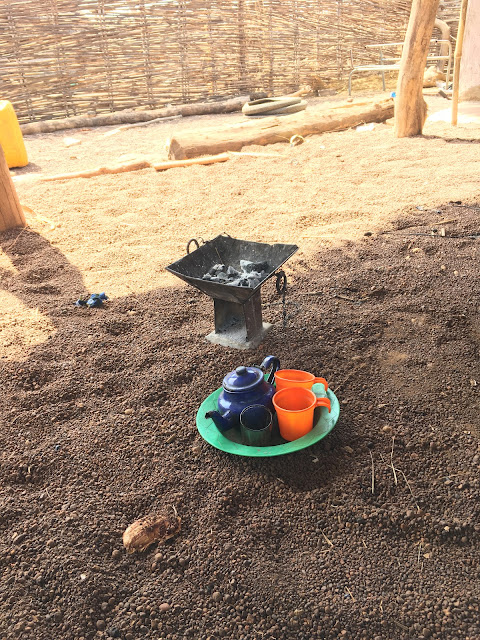Baba
I am walking through the cornfield to greet my host father in the morning, him bent over picking up a piece of split bamboo that he will weave to make a fence. Corn will be planted next month; the field sits fallow, a dead wasteland of dry soil and two lonely mango trees that have just shed their final fruit of the season. It has not rained in seven months.
Baba is wearing a pair of work-torn dark grey pants and a navy blue suit jacket with no shirt. His short salt-and-pepper curls of hair give away his receding hairline; it has been three weeks since he last shaved his head. A Guinean cigarette dangles out of the corner of his mouth, the smoke dissipating quickly in the morning breeze. The sun is bright and the air around me is beginning to heat up already. “Baba!” I say three times with steadily increasing volume. At my third call, Baba turns around and straightens up, saying “Hmm?” Then softly, in his deep baritone, he says “Mamadou, naamansii” in mumbled greeting, a warm grin shining through the wrinkles around his eyes. I extend my hand and he grasps it limply. His fingers are dry and calloused. “Did you get some sleep?” he continues. As he moves his arms, his suit jacket opens to reveal the abs of a semi-professional midfielder. “Yes, I got some sleep,” I respond. His gaze lingers on me for a moment before turning back to his work. Our hands part. The corners of his mouth are still fashioned into a subtle smile as he transfers his machete back to his right hand and picks up another piece of bamboo to split.
***
I am again walking through the cornfield, coming back to my family’s compound in the early evening after greeting a friend who lives across the village. The sun is a few minutes from turning a deep orange and dipping below the horizon. Just before opening the back gate, I glance nonchalantly into Baba’s backyard over the four-foot-tall fence he made last year from large tree branches. I often take a look around as I enter the compound to get an idea of who is home, whom I may need to greet.
Baba is in the midst of a bucket shower. He is soaping up his chest with a loofah made from tree bark, everything hanging out for all to see. I do not know that this vantage point gives me a direct view of his bathing area. The rest of my family knows, and they accordingly choose not to walk this path while Baba is showering. Or if they do walk through the gate, they know not to peek over the fence absentmindedly. But I do not know this. When I see him—all of him—Baba is smiling. White suds drip off his arms and chest, obscuring for a moment his toned frame. He has seen me coming, surely. He saw me walking home from across the field. He saw me approaching the back gate, which adjoins his yard. He saw me begin to turn my head to look into his yard. And yet, he smiles. That same smile that makes his eyes gleam, the corners of his mouth turned upwards as if they do not know how to frown. My cheeks, already red from the day’s heat, begin to blush. I break my eye contact with Baba and look back towards the gate. I can feel his smiling eyes still watching me, chuckling to himself as the yellowing sun begins to dip below the horizon.
***
It is late in the evening, one of my last nights spent in village before the evacuation. Baba, lying on his wooden outdoor bed, asks me to count the number of small pebbles in his hand. He cannot read, cannot write. The pebbles he scooped up total a sum so large it has taken him ages to count. But time is the common denominator on a Senegalese night, the currency everyone has and shares with one another. After eighteen months here, this task is so easy as to be an insult to my intelligence. If I had been asked by someone my age, I would have laughed it off as a joke, saying “Really? I could have counted these pebbles at the end of my first month in Senegal.” But the rules are different when old men ask the questions.
A feeling begins to creep up in the pit of my stomach. This question may be my last chance to show off my Diakhanke language, prove to Baba that his time and effort teaching me have been worth it. So I do not roll my eyes, but instead count out loud, one at a time as I transfer the pebbles from my right hand to my left. “Kilin, fula, saba…” I project my voice more than I normally would so that Baba can hear each and every syllable. My host moms, silently using their hands to scoop the last bites of rice from their shared green plastic bowl, listen intently from across the compound. As I get to 22, my eyes start to tear up, thinking about my seemingly inevitable evacuation from Senegal. The probable evacuation is looming over my head like a dark rain cloud. It is unclear if the predicted storm will come to fruition, but if it does, the consequences will be devastating to all in its path. I am thankful for the darkness to cover up my watery eyes and I do not let my voice waver. I continue to count the pebbles one by one as Baba watches from his position on the bed, one elbow propping up his torso. I get to forty and proudly proclaim “Forty. Forty are here.” Baba smiles and says “Mamadou knows. Mamadou knows our language.”




Comments
Post a Comment